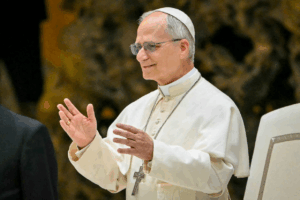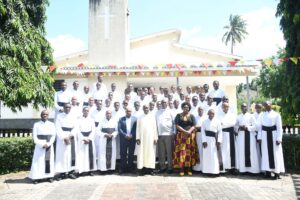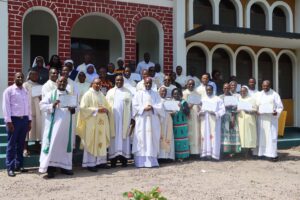AMECEA: AMECEA Trains Administrators in Kenya’s Catholic Institutions, to “Effectively and Efficiently Utilize Resources”

Finance Administrators in Kenya’s Catholic Institutions
Sr. Jecinter Antoinette Okoth, FSSA
At an ongoing training by the Association of Member Episcopal Conferences in Eastern Africa (AMECEA) through the Finance and Administration department, participants drawn from various Catholic institutions are being empowered on the effective and efficient use of available resources in their institutions.
Speaking during opening of the two-week training which commenced Monday, August 2, at JJ McCarthy Centre, Nairobi, Deputy General Secretary for the Kenya Conference of Catholic Bishops (KCCB) Fr. Bernard Ngaruiya emphasized to participants that the capacity building is to equip them “with knowledge to identify and mobilize resources and to effectively and efficiently utilization the very resources for the good of the institutions.”
The cleric from Kenya’s Nakuru diocese who is nearly two months old at KCCB, reminded participants who were mainly finance and project managers, caritas directors and procurators of Dioceses that “financial management is necessary to enhance good performance and to enable our institutions know how to invest on what we already have.”
Fr. Ngaruiya who before his appointment as the Deputy General Secretary has been the Diocesan chaplain of choir and parish priest of St. Francis Xavier, Naivasha, in Nakuru Diocese, underscored that administrators need to be well equipped with knowledge on capital budgeting, investment decisions and returns on investments.
“Capital budgeting is important since it helps create accountability and measurability while investment decisions enlighten finance managers to brainstorm on the relevance of investments and sources of funds for the same investments,” the cleric said while addressing over 50 participants most of whom clergy adding that, “understanding returns on investments helps us know how to use what we have and spread the risks.”
The ongoing training themed “Strengthening financial self-reliance of local churches in Eastern Africa” was a decision by the bishops to have a self-reliance church in the AMECEA region hence capacity building has already been done in various countries including Malawi, Zambia, Tanzania, and Uganda to different groups including bishops.
Meanwhile speaking at the same venue for opening the training, the AMECEA Secretary General Fr. Anthony Makunde, explained the relevance e of the association in the region saying, “AMECEA stands for solidarity and was born out of a desire of having common pastoral approach to issues of common interest in the region.”
He noted that the guiding spirit of the founding fathers “was to foster collaboration and solidarity for the advancement of the common good in the region and beyond… by thinking globally and acting locally in addressing broader issues whose magnitude and significance touched the entire continent and the Universal Church at large.”
Fr. Makunde disclosed to participants that right from the first Plenary Assembly of bishops in 1961, the prelates laid down areas of concern which the region has slowly on been committed to fulfilling including: “Establishment of a regional television, radio station and printing press, fostering on the spiritual formation for diocesan priests, having a centre for pastoral renewal and on-going formation, having a regional University or College, developing a comprehensive self-reliance program, looking at the future of Catholic schools and Catholic education thus the need for a Christian Religious syllabus and promoting justice and peace issues in the region.”
The program funded by Missio Aachen is being facilitated by personnel from the Catholic University of Eastern Africa (CUEA), a university founded by AMECEA.


